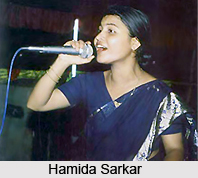 Hamida Sarkar, was born in 23rd March 1978, at the village Sindurai Part-II in the district of Dhubri (Assam), in an underprivileged family. In 1994, she passed HSLC from Agomani Higher Secondary School. Since her childhood, she demonstrated passionate love for music. Sarkar was just 5 years old when she appeared for the first time to perform in a musical programme. It was the occasion of the Birth Anniversary of Rasharaj Laksminath Bezbaruah, held at Agomani in the year 1983. At that tender age she received rave acclamation from the audience and the potentiality of a famous singer was born.
Hamida Sarkar, was born in 23rd March 1978, at the village Sindurai Part-II in the district of Dhubri (Assam), in an underprivileged family. In 1994, she passed HSLC from Agomani Higher Secondary School. Since her childhood, she demonstrated passionate love for music. Sarkar was just 5 years old when she appeared for the first time to perform in a musical programme. It was the occasion of the Birth Anniversary of Rasharaj Laksminath Bezbaruah, held at Agomani in the year 1983. At that tender age she received rave acclamation from the audience and the potentiality of a famous singer was born.
Early life of Hamida Sarkar
In 1996, Hamida Sarkar joined the Maruchmati Shilpi Samaj, Agomani, a reputed cultural organization of that locality. In the years 1988 and 1997, the 54th Asom Sahitya Shabha was held at Hailakandhi and Bilashipara. Hamida Sarkar performed in both the occasions. On the occasion of State Level Kalaguru Bishnu Rabha Dibhas held in 1990, she was present too. It was held at District Library, Dhubri. Yet again, in 1991, on the birth anniversary of Late Abbachuddin Ahmed she was invited as the guest artist to perform in the function held at Balrampur District (West Bengal).
Professional Life of Hamida Sarkar
Hamida also attended, the Uttar Bangla Rajya Bhowaia at Falakata (West Bengal) in 1997. At the function, she was entitled, "Miss Bhowaia". She was invited by Maharani Gayatri Devi to perform in Jaipur (Rajasthan) in 2000. She has also performed in the prestigious "Elephant Festival, 2003" at Kaziranga. Sarkar has also lend her voice to audio cassette recording with number of noted singers of the state; "Matir Manush" in the year of 1991, being the first one, followed by, "Adorer Moina", "Ganghadarer Pare Pare", "Man Kore Ushpash", "Nalchand", "Shujan Bandhu", "Kanyadhan", "Pirit Mane Pagla Hawa" "Hriddar Agun", "Dui Diner Bhalobasha"(with Padmashri Pratima Pandey). As a playback singer, Hamida Sarkar sang for the Goalparia film "Mainar Chokher Jal", and "Maishaler Bashi".
This article is a stub. You can enrich by adding more information to it. Send your Write Up to content@indianetzone.com




















